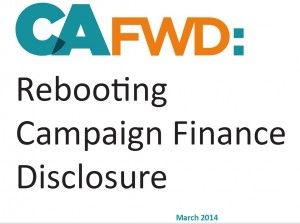CA advances transparency — but needs some work
by John Seiler | March 17, 2014 6:42 pm
 [1]This is Sunshine Week[2], a time to promote transparency in government. An AP analysis found[3] that the Obama administration, which came into office promising to be the most transparent ever, has become more secretive.
[1]This is Sunshine Week[2], a time to promote transparency in government. An AP analysis found[3] that the Obama administration, which came into office promising to be the most transparent ever, has become more secretive.
Fortunately, things are better out here with our California governments, state and local. Today California Forward, a reform group, released its new report, “Rebooting Finance Disclosure[4].” It found that, while the state has made great strides in releasing campaign-related information, “Governments in California need to accelerate their embrace of technology, and a good place to begin is transparency of elections-related data.”
Put another way, making data available isn’t much use unless citizens can have ready and easy access to it. Specifically, the report found:
“The most critical deficiency in the State’s existing system is not a lack of data or the legal requirements for disclosure, but a lack of ready access to this information. New systems should allow for flexible downloading of raw data and, optimally, create an identification system for donors and recipients that allows for their various campaign finance, statement of economic interest, contracting and other filings to be connected and analyzed as part of a global view of financial activity surrounding public officials and decisions. This would be an innovation, providing transparency on the connections between financial interactions and public decisions, and in par-ticular, the activities of public officials over time.”
The report pointed to Illinois, where “the State Board of Elections sends an XML data file to the Comptroller at regular intervals to allow for the juxtaposition of state contracts with campaign contributions.”
For California, this would mean coordinating the Form 700 “Statement of Economic Interest”[5] filings to the Fair Political Practices Commission with the Cal-Access system[6] of the Secretary of State, which lists campaign contributions and expenditures.
Municipalities
CA Forward also recommended that similar measures be advanced with county registrars for county, city, school district and other municipal elections. Currently, less than 20 percent of cities adequately make campaign data transparent. “Now the standard for state and federal government, making scanned PDFs available online should be the norm in cities with adequate resource,” stated CA Forward.
PDF technology today is cheap and easy to use. And although many city budgets are pinched, advancing transparency should be a prime function of democratic bodies.
Further, CA Forward also advanced putting all municipal data in a central system, such as already exists in Alaska, Delaware, Missouri, New Jersey, New York, Rhode Island and South Carolina. Doing so would make it easier, for example, for citizen-researchers and journalists to discover patterns of donations to school boards across many districts and counties.
Controller
CA Forward also commended Controller John Chiang for advancing transparency for state worker compensation. Chiang’s site[7] now says it “features tools making it easier to search for information, make custom reports and download raw data.
“The database includes pay information for public employee positions in cities, counties, special districts and workers paid by the Controller, including state employees, the California State University, legislators, and statewide elected officials.”
He also notes that California Community Colleges voluntarily have provided their data to his site. And the University of California is expected to follow suit this spring.
However, he still is working to get the data for K-12 public school teachers. The Los Angeles Times reported last month[8]:
“State Controller John Chiang has asked every public school district in the state to provide salary and benefit information for all employees and elected officials so that it can be posted on the Web and shared with the public.
“Chiang has said that making the salary information easy to access on a state Web page is another step toward government transparency in the wake of the 2010 salary scandal in Bell.
“The controller mailed a letter Monday to 58 county offices of education, 949 school districts and 992 charter schools, requesting the information in no later than 90 days.”
By keeping the public’s eye on officials, the new transparency also can’t help but make less likely the scandals that recently led to the leaves of absence taken by two state senators, Roderick Wright[9], D-Los Angeles; and Ron Calderon[10], D-Montebello.
- [Image]: http://calwatchdog.com/wp-content/uploads/2014/03/CA-Forward.jpg
- Sunshine Week: http://www.sunshineweek.org/
- An AP analysis found: http://www.washingtonpost.com/blogs/federal-eye/wp/2014/03/17/sunshine-week-transparency-issues-persist-with-obama-administration/
- Rebooting Finance Disclosure: http://www.cafwd.org/pages/rebooting-campaign-finance-disclosure
- Form 700 “Statement of Economic Interest”: http://www.fppc.ca.gov/INDEX.php?id=500
- Cal-Access system: http://dbsearch.ss.ca.gov/
- Chiang’s site: http://www.sco.ca.gov/compensation_search.html
- The Los Angeles Times reported last month: http://articles.latimes.com/2014/feb/04/local/la-me-0205-school-salaries-20140205
- Roderick Wright: http://www.sacbee.com/2014/02/25/6189732/california-sen-rod-wright-to-take.html
- Ron Calderon: http://www.sacbee.com/2014/03/03/6202974/ron-calderon-takes-leave-of-absence.html
Source URL: https://calwatchdog.com/2014/03/17/ca-advances-transparency-but-needs-some-work/